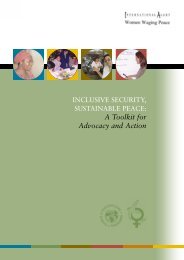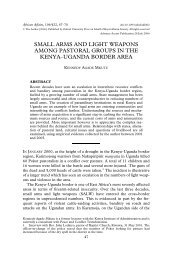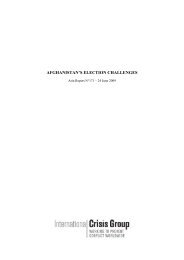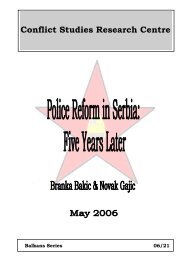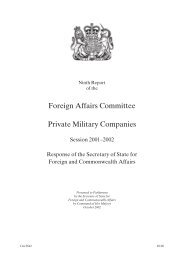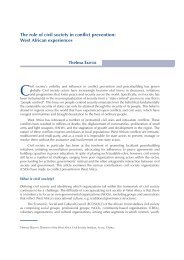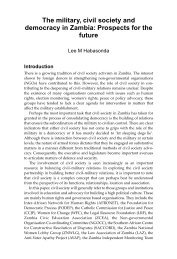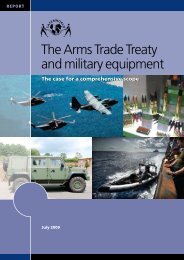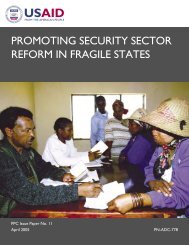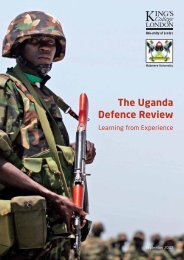security sector reform (ssr) in guinea-bissau - Observatoire de l'Afrique
security sector reform (ssr) in guinea-bissau - Observatoire de l'Afrique
security sector reform (ssr) in guinea-bissau - Observatoire de l'Afrique
Create successful ePaper yourself
Turn your PDF publications into a flip-book with our unique Google optimized e-Paper software.
SECURITY SECTOR REFORM (SSR)<br />
IN GUINEA-BISSAU<br />
Africa Brief<strong>in</strong>g Report<br />
Egmont Palace, Brussels – 28 January 2008<br />
February – 2008
Febr uar y 2008<br />
List of Abbreviations<br />
DDR<br />
DRC<br />
ECOWAS<br />
EU<br />
EDF<br />
ESDP<br />
MFDC<br />
UNDP<br />
Disarmament, Demobilisation and Re<strong>in</strong>tegration<br />
Democratic Republic of Congo<br />
Economic Community of Western African States<br />
European Union<br />
European Development Fund<br />
European Security and Defence Policy<br />
Mouvement <strong>de</strong>s Forces Démocratiques <strong>de</strong> la Casamance<br />
United Nations Development Programme<br />
Page 2 – Gu<strong>in</strong>ea-Bissau SSR re port
Febr uar y 2008<br />
Introduction<br />
After many years of political <strong>in</strong>stability and<br />
three failed attempts of DDR, there is a<br />
renewed effort <strong>in</strong> Gu<strong>in</strong>ea-Bissau to get DDR<br />
and SSR right. With a national strategy and action<br />
plan on SSR <strong>in</strong> place, Gu<strong>in</strong>ea-Bissau has<br />
attracted a lot of attention from the <strong>in</strong>ternational<br />
community. Many donors, the European Union<br />
(EU) among others, are send<strong>in</strong>g experts to<br />
assist <strong>in</strong> the SSR process <strong>in</strong> Gu<strong>in</strong>ea-Bissau.<br />
While there are favourable circumstances for<br />
SSR <strong>in</strong> Gu<strong>in</strong>ea-Bissau such as a will<strong>in</strong>gness and<br />
commitment displayed by the national<br />
authorities, a number of difficulties and challenges<br />
were highlighted dur<strong>in</strong>g the brief<strong>in</strong>g. The Army,<br />
which is by far the most powerful actor <strong>in</strong><br />
Gu<strong>in</strong>ea-Bissau, has to be brought <strong>in</strong>to the<br />
<strong>reform</strong> process. In addition, the large numbers of<br />
donors and experts have to be absorbed,<br />
organized and most off all coord<strong>in</strong>ated.<br />
DDR and SSR are <strong>in</strong>creas<strong>in</strong>gly <strong>de</strong>alt with together<br />
which has become an automatism of donors.<br />
Over the past years, real progress has been ma<strong>de</strong><br />
on the concepts of DDR and SSR. Among the<br />
donor community there is an emerg<strong>in</strong>g consensus<br />
that DDR and SSR have to be <strong>in</strong>clu<strong>de</strong>d <strong>in</strong> the<br />
framework of the broa<strong>de</strong>r governance agenda<br />
and that long term perspectives have to be taken<br />
<strong>in</strong>to account. Yet, while the theories of DDR<br />
and SSR are well-<strong>de</strong>veloped implementation<br />
rema<strong>in</strong>s a challenge.<br />
SSR: A difficult bus<strong>in</strong>ess<br />
Most SSR programmes are <strong>de</strong>veloped without<br />
<strong>de</strong>tailed knowledge and analysis of the respective<br />
situation on the ground. In the case of Gu<strong>in</strong>ea-<br />
Bissau, there is a lack of knowledge among<br />
the donor community at times. Hence, the<br />
danger of <strong>de</strong>velop<strong>in</strong>g SSR policies that are not <strong>in</strong><br />
tune with the actual situation on the ground.<br />
A firm un<strong>de</strong>rstand<strong>in</strong>g of what is happen<strong>in</strong>g <strong>in</strong><br />
the field is nee<strong>de</strong>d. Without that k<strong>in</strong>d of<br />
contextualised <strong>in</strong>formation, SSR programmes<br />
will not be able to i<strong>de</strong>ntify the “right locals” nee<strong>de</strong>d<br />
for local ownership.<br />
A further difficulty arises from the sensitivity<br />
of the <strong>security</strong> <strong>sector</strong>. DDR and SSR both<br />
touch the key govern<strong>in</strong>g functions of the state<br />
that are very closely l<strong>in</strong>ked to its sovereignty. In<br />
addition, DDR and SSR work with soldiers who<br />
are attached to their uniform and weapon and<br />
often have no alternative other than to be a soldier.<br />
Thus, the <strong>in</strong>ternational community is faced with<br />
a difficult <strong>in</strong>stitutional situation. It touches <strong>in</strong><strong>de</strong>ed<br />
upon doma<strong>in</strong>s that are extremely protected and<br />
where the military has a firm grip on power. One<br />
of the primary similarities between many African<br />
countries is the fact that political power equals<br />
military power. There is a complete merger of<br />
the two notions. Whoever controls the military<br />
controls the country and this is also the case <strong>in</strong><br />
Gu<strong>in</strong>ea-Bissau. Hence, when engag<strong>in</strong>g <strong>in</strong> DDR<br />
and SSR processes, donors touch upon extremely<br />
<strong>de</strong>licate balances of power and are not able to<br />
offer soldiers an alternative source of power be<br />
it economic or political. It has to be taken <strong>in</strong>to<br />
account that a mere reduction of military forces,<br />
for <strong>in</strong>stance, is <strong>in</strong>sufficient. Democratic control<br />
over the military has to be organised. Parliament<br />
has to be able to review the <strong>de</strong>fence budget and<br />
make the necessary changes to it.<br />
Page 3 – Gu<strong>in</strong>ea-Bissau SSR re port
Febr uar y 2008<br />
In most cases, SSR has to be conducted <strong>in</strong> postconflict<br />
and fragile states where the state has<br />
no capability to exercise its core functions, lacks<br />
technical capacity and often has little political<br />
legitimacy. While, <strong>in</strong> the case of Gu<strong>in</strong>ea-Bissau,<br />
political legitimacy of the government is not <strong>in</strong><br />
question, there is a fundamental lack of capacity.<br />
In this regard, Gu<strong>in</strong>ea-Bissau is a fragile state<br />
which is not able to control its territory, which<br />
lacks operationally effective armed forces, and<br />
where the police is not able to fulfil its core functions<br />
due to the omnipresence of the armed forces.<br />
SSR programmes tend to focus on the national<br />
level while ignor<strong>in</strong>g the regional context. Gu<strong>in</strong>ea-<br />
Bissau, like many other African countries, is<br />
confronted with that regional <strong>in</strong>stability on a daily<br />
bases, and yet so far SSR programmes lack the<br />
appropriate <strong>in</strong>struments that take the regional<br />
context <strong>in</strong>to account.<br />
Another important difficulty arises from the fact<br />
the donors have repeatedly engaged <strong>in</strong> SSR and<br />
DDR simultaneously, often blend<strong>in</strong>g the two<br />
together, and worse, even confus<strong>in</strong>g the two. This<br />
ignores the dist<strong>in</strong>ct different rhythms of the two<br />
processes. For <strong>in</strong>stance, <strong>de</strong>mobilised soldiers that<br />
have taken part <strong>in</strong> DDR programmes are used to<br />
establish a new police force as part of the SSR<br />
process. This however ignores the simple facts that<br />
a soldier will never be a policeman and that, <strong>in</strong> an<br />
unstable political situation, mak<strong>in</strong>g a policeman out<br />
of a soldier will create the problems and the wars<br />
of tomorrow. Yet, the <strong>in</strong>ternational community<br />
repeatedly makes this mistake.<br />
So far there has not yet been a proper analysis<br />
on what exactly has gone wrong <strong>in</strong> previous DDR<br />
attempts. However, the government of Gu<strong>in</strong>ea-<br />
Bissau and donors will embark on a fourth<br />
DDR exercise without hav<strong>in</strong>g asked themselves<br />
what and why th<strong>in</strong>gs have gone wrong <strong>in</strong> the<br />
past. As a result, there is a real risk that the same<br />
people that have benefited form previous<br />
programmes will be targeted aga<strong>in</strong> with little<br />
chances of success. Particularly the crucial, longterm<br />
re<strong>in</strong>tegration of those <strong>de</strong>mobilised appears to<br />
be neglected. Re<strong>in</strong>tegration requires the creation<br />
of alternative livelihoods and economic<br />
alternatives. In this regard, UNDP is plann<strong>in</strong>g to<br />
conduct a study on the conduct of the previous<br />
DDR processes <strong>in</strong> Gu<strong>in</strong>ea-Bissau as well as a new<br />
analysis on the labour market which is look<strong>in</strong>g <strong>in</strong><br />
<strong>de</strong>pth at the re<strong>in</strong>tegration aspect.<br />
Coord<strong>in</strong>ation of activities is key to any successful<br />
SSR programme as donors tend to have a different<br />
un<strong>de</strong>rstand<strong>in</strong>g of SSR which often leads to<br />
difficulties <strong>in</strong> terms of cooperation on the ground.<br />
Yet, if multiple donors with different priorities<br />
are engaged <strong>in</strong> an un-coord<strong>in</strong>ated manner, SSR<br />
is doomed to fail. With around 50 different<br />
experts to be on the ground <strong>in</strong> Gu<strong>in</strong>ea-Bissau<br />
proper coord<strong>in</strong>ation and a division of labour<br />
will be vital.<br />
National efforts<br />
After three failed attempts of DDR, Gu<strong>in</strong>ea-<br />
Bissau shows strong commitment to get SSR<br />
right. Gu<strong>in</strong>ea-Bissau is restructur<strong>in</strong>g the whole<br />
<strong>security</strong> <strong>sector</strong> and <strong>de</strong>veloped a national strategy<br />
for SSR <strong>in</strong> November 2006. This first national<br />
plan <strong>de</strong>f<strong>in</strong>es a set of measures to restructure<br />
and reorganise the <strong>de</strong>fence and <strong>security</strong> <strong>sector</strong>.<br />
The present situation of the <strong>security</strong> <strong>sector</strong> <strong>in</strong><br />
Gu<strong>in</strong>ea-Bissau is not adapted to the present<br />
needs. The Army is oversized, the personnel is<br />
ag<strong>in</strong>g and composed of a number of compet<strong>in</strong>g<br />
services that do not comply with the law.<br />
Furthermore, the Army lacks tra<strong>in</strong><strong>in</strong>g, has no<br />
resources and shows resistance to <strong>in</strong>novation.<br />
The police force is ill-equipped, lacks clearly<br />
<strong>de</strong>f<strong>in</strong>ed competences and can rarely fulfil its<br />
functions due to an omnipresence of the Armed<br />
Forces. The judiciary lacks, among others, capacity,<br />
Page 4 – Gu<strong>in</strong>ea-Bissau SSR re port
Febr uar y 2008<br />
f<strong>in</strong>ancial autonomy and does not comply with<br />
the pr<strong>in</strong>ciple of separation of power. In this<br />
regard, the national strategy for SSR aims at<br />
downsiz<strong>in</strong>g the Army with new and clearly<br />
<strong>de</strong>f<strong>in</strong>ed structures; it aims at mo<strong>de</strong>rnis<strong>in</strong>g and<br />
restructur<strong>in</strong>g the police force from n<strong>in</strong>e to four<br />
bodies with better <strong>de</strong>f<strong>in</strong>ed competences; and<br />
plans to build capacity <strong>in</strong> the judiciary.<br />
In or<strong>de</strong>r to <strong>de</strong>velop clear and concrete actions<br />
for SSR, Gu<strong>in</strong>ea-Bissau has adopted an Action<br />
Plan, <strong>in</strong>itially cover<strong>in</strong>g the period of 2007-2009<br />
(a second plan will follow for the period of<br />
2009-2011). The Action Plan will implement a<br />
responsible structure, eventual sources of f<strong>in</strong>anc<strong>in</strong>g,<br />
a new framework for <strong>in</strong>tervention of the<br />
government and a mo<strong>de</strong>rnization and<br />
transformation of the <strong>security</strong> <strong>sector</strong>. The Action<br />
Plan is budgeted at 184 million USD, with a<br />
consi<strong>de</strong>rable contribution provi<strong>de</strong>d by the EU. In<br />
addition, Gu<strong>in</strong>ea-Bissau has created a new<br />
<strong>in</strong>stitutional framework implementation of the<br />
process, placed un<strong>de</strong>r the responsibility of the<br />
Prime M<strong>in</strong>ister. It is composed of an Inter-M<strong>in</strong>isterial<br />
Committee, a Pilot<strong>in</strong>g Committee, a Technical<br />
Coord<strong>in</strong>ation Committee, and a bureau support<strong>in</strong>g<br />
the execution, implementation and follow-up of the<br />
national strategy.<br />
The ESDP SSR mission <strong>in</strong> Gu<strong>in</strong>ea-Bissau<br />
The <strong>in</strong>ternational community has shown strong<br />
commitment to Gu<strong>in</strong>ea-Bissau. In 2006, an<br />
<strong>in</strong>ternational contact group, co-chaired by<br />
Portugal and ECOWAS, was established.<br />
Furthermore, Gu<strong>in</strong>ea-Bissau was put on the<br />
agenda of the UN Peace Build<strong>in</strong>g Commission<br />
<strong>in</strong> December 2007.<br />
As far as EU efforts are concerned, the EU will<br />
contribute to SSR <strong>in</strong> Gu<strong>in</strong>ea-Bissau by<br />
<strong>de</strong>ploy<strong>in</strong>g a civilian ESDP mission , start<strong>in</strong>g <strong>in</strong><br />
April for a period of 12 months, to assist the<br />
government of Gu<strong>in</strong>ea-Bissau <strong>in</strong> the <strong>reform</strong><br />
process. The EU participation has to be seen <strong>in</strong><br />
the context of a history of <strong>in</strong>volvement <strong>in</strong><br />
Gu<strong>in</strong>ea-Bissau. Gu<strong>in</strong>ea-Bissau has already<br />
benefited from some SSR programmes un<strong>de</strong>r<br />
the 8 th and 9 th EDF and will receive funds for<br />
SSR from the 10 th EDF. Un<strong>de</strong>r the 9 th EDF,<br />
assistance to Gu<strong>in</strong>ea-Bissau was focused on some<br />
justice <strong>reform</strong> programmes, technical assistance<br />
and the tra<strong>in</strong><strong>in</strong>g of magistrates. Un<strong>de</strong>r the 10 th<br />
EDF, a package of 27 million Euros un<strong>de</strong>r the<br />
focal <strong>sector</strong> of ‘Conflict Prevention’ is foreseen<br />
which will <strong>in</strong>clu<strong>de</strong> justice and public<br />
adm<strong>in</strong>istration programmes.<br />
In general, this ESDP mission also has to be seen<br />
<strong>in</strong> the context of an <strong>in</strong>creas<strong>in</strong>g focus on SSR<br />
and SSR related issues from the si<strong>de</strong> of the EU<br />
s<strong>in</strong>ce December 2005..<br />
Scope of the mission<br />
The ESDP SSR mission <strong>in</strong> Gu<strong>in</strong>ea-Bissau will<br />
be comprised of 15 experts. It will be a targeted<br />
<strong>in</strong>tervention aimed at creat<strong>in</strong>g the conditions for<br />
the implementation of the national <strong>security</strong> strategy.<br />
It will be based on the pr<strong>in</strong>ciple of local ownership,<br />
support<strong>in</strong>g the implementation of the strategy<br />
chosen by the national authorities themselves.<br />
The mission will un<strong>de</strong>rtake the follow<strong>in</strong>g<br />
actions:<br />
• advise on the <strong>de</strong>tailed resiz<strong>in</strong>g and restructur<strong>in</strong>g<br />
of the Armed Forces;<br />
• assist <strong>in</strong> the <strong>de</strong>velopment of a doctr<strong>in</strong>e for the<br />
Armed Forces;<br />
• support the <strong>de</strong>velopment of a legal framework<br />
for the restructur<strong>in</strong>g of the police force from<br />
n<strong>in</strong>e <strong>in</strong>to four bodies;<br />
• advise on the plann<strong>in</strong>g and <strong>de</strong>velopment of an<br />
effective crim<strong>in</strong>al <strong>in</strong>vestigation capacity;<br />
Page 5 – Gu<strong>in</strong>ea-Bissau SSR re port
Febr uar y 2008<br />
• advise Interpol National Central Bureau <strong>in</strong><br />
Gu<strong>in</strong>ea-Bissau;<br />
• advise and tra<strong>in</strong><strong>in</strong>g for the judicial police;<br />
• advise prosecution services; and<br />
• advise on issues such as the ma<strong>in</strong>stream<strong>in</strong>g on<br />
good governance standards <strong>in</strong> the <strong>reform</strong><br />
process.<br />
For the EU, SSR is part of a broa<strong>de</strong>r approach<br />
which <strong>in</strong>clu<strong>de</strong>s the rebuild<strong>in</strong>g of social and economic<br />
<strong>in</strong>frastructure <strong>in</strong> Gu<strong>in</strong>ea-Bissau.<br />
Particular challenges for SSR<br />
<strong>in</strong> Gu<strong>in</strong>ea-Bissau<br />
With regard to SSR <strong>in</strong> Gu<strong>in</strong>ea-Bissau, several<br />
key challenges were presented:<br />
• Today, we witness an explosion of <strong>in</strong>terest <strong>in</strong><br />
Gu<strong>in</strong>ea-Bissau. Many traditional donors, who<br />
have not been <strong>in</strong>volved <strong>in</strong> Gu<strong>in</strong>ea-Bissau<br />
before, such as the UK, are present because<br />
of the simple fact that there is SSR. In<br />
addition, new partners such as Ch<strong>in</strong>a and<br />
Brazil have also arrived. Two challenges<br />
come along with the huge number of experts<br />
and donors <strong>de</strong>scend<strong>in</strong>g on Gu<strong>in</strong>ea-Bissau.<br />
Firstly, it requires an absorption capacity.<br />
How will Gu<strong>in</strong>ea-Bissau be able to absorb<br />
the flood of experts? How will they lead the<br />
donor community? How will they organise<br />
them? Secondly, there is an absolute need for<br />
coord<strong>in</strong>ation and coherence at the level<br />
of the donor community. So far there is no<br />
mechanism <strong>in</strong> place to coord<strong>in</strong>ate the arrival of<br />
around 50 experts <strong>in</strong> Gu<strong>in</strong>ea-Bissau. Who<br />
will take the lead?<br />
• One of the illustrations of the need to<br />
coord<strong>in</strong>ate is the “war of experts” which has<br />
been seen <strong>in</strong> so many African countries.<br />
What role will they play? What is their<br />
contribution to DDR and SSR efforts?<br />
What are the selection criteria? Are they able<br />
to speak Portuguese <strong>in</strong> or<strong>de</strong>r to be able to<br />
communicate effectively with local<br />
authorities? Is it really the appropriate<br />
response to send 50 experts to Gu<strong>in</strong>ea-<br />
Bissau?<br />
• In Gu<strong>in</strong>ea-Bissau no dist<strong>in</strong>ct centres of<br />
power exist. While one of the targets of<br />
SSR is the Army, they are also the ones that<br />
hold exclusive power <strong>in</strong> the state. This leads<br />
to a situation where the Army basically has<br />
to <strong>reform</strong> itself. Yet, any real <strong>reform</strong> of the<br />
Army will equal a loss of its power and<br />
Page 6 – Gu<strong>in</strong>ea-Bissau SSR re port
Febr uar y 2008<br />
<strong>in</strong>fluence and, hence, is perceived as<br />
threaten<strong>in</strong>g. Un<strong>de</strong>r these circumstances,<br />
SSR has to be conducted with great care. If<br />
SSR <strong>in</strong> Gu<strong>in</strong>ea-Bissau is to be successful, the<br />
right pace of <strong>reform</strong> has to be found and<br />
confi<strong>de</strong>nce-build<strong>in</strong>g measures have to be <strong>in</strong><br />
place. Otherwise it will aggravate mistrust<br />
among the military with a risk of renewed<br />
violence and regional <strong>in</strong>stability. To push for<br />
a <strong>reform</strong> of the Armed Forces with all force <strong>in</strong><br />
an unstable political situation would be a recipe<br />
for failure.<br />
• While there does not appear to be a great risk<br />
of regional <strong>in</strong>stability that could impact on the<br />
SSR process, Gu<strong>in</strong>ea-Bissau has ma<strong>in</strong>ta<strong>in</strong>ed<br />
l<strong>in</strong>ks with the Mouvement <strong>de</strong>s Forces Démocratiques<br />
<strong>de</strong> la Casamance (MFDC) <strong>in</strong> Senegal of which<br />
some have jo<strong>in</strong>ed the Armed Forces of<br />
Gu<strong>in</strong>ea-Bissau. This might lead to future<br />
problems if tensions grow and thus has to be<br />
factored <strong>in</strong>.<br />
• A further fundamental challenge with<br />
regard to Gu<strong>in</strong>ea-Bissau is the problem of<br />
drug-traffick<strong>in</strong>g which is likely to<br />
complicate matters for SSR. The<br />
phenomenon of drug-traffick<strong>in</strong>g and the<br />
huge amounts of money it has brought <strong>in</strong>to the<br />
country have given no <strong>in</strong>centive<br />
whatsoever to do “real” SSR. Given the<br />
current lack of economic alternatives great<br />
emphasis has to be given to susta<strong>in</strong>able<br />
economic <strong>de</strong>velopment.<br />
• The donor community has to be aware of<br />
the fact that neither SSR nor DDR alone<br />
will br<strong>in</strong>g long term stability to the country.<br />
Furthermore, the <strong>in</strong>terest <strong>in</strong> and fund<strong>in</strong>g for<br />
DDR and SSR on part of the donor<br />
community has to be complemented with<br />
<strong>in</strong>vestment <strong>in</strong> the human capital of Gu<strong>in</strong>ea-<br />
Bissau alongsi<strong>de</strong> social and economic<br />
<strong>in</strong>frastructure.<br />
Page 7 – Gu<strong>in</strong>ea-Bissau SSR re port
Febr uar y 2008<br />
Africa Brief<strong>in</strong>g<br />
Security Sector Reform <strong>in</strong> Gu<strong>in</strong>ea-Bissau<br />
Orange Room, Egmont Palace, 28 January 2008<br />
18.00 – 20.00<br />
CHAIR:<br />
Prof. Dr. Koen Vlassenroot (Director Central Africa Programme – EGMONT, Professor Ghent<br />
University).<br />
PANEL:<br />
• Dr. Baciro Dja (Director of the Instituto da Defesa Nacional, coord<strong>in</strong>ator SSR Technical Committee)<br />
• Sophie da Câmara Santa Clara Gomes (Senior DDR Advisor, UNDP)<br />
• Genoveva Hernan<strong>de</strong>z (General Secretariat of the Council of the EU)<br />
• V<strong>in</strong>cent Foucher (Researcher CEAN-CNRS)
Febr uar y 2008<br />
Mission Statement<br />
The '<strong>Observatoire</strong> <strong>de</strong> <strong>l'Afrique</strong>' is a network of <strong>in</strong><strong>de</strong>pen<strong>de</strong>nt experts and <strong>in</strong>stitutes coord<strong>in</strong>ated by the<br />
Central Africa Programme of the Brussels based EGMONT – Royal Institute for International<br />
Relations. The network aims at encourag<strong>in</strong>g discussion between African and European experts on<br />
African <strong>security</strong> and political issues. This project was <strong>in</strong>itiated to remedy the non-existence of a<br />
comprehensive forum for aca<strong>de</strong>mic and professional exchanges on African issues of relevance for<br />
CFSP and ESDP, <strong>in</strong>clud<strong>in</strong>g a wi<strong>de</strong> range of African stakehol<strong>de</strong>rs. The overall aim is to create a forum<br />
for open, constructive dialogue and <strong>de</strong>bate, and provi<strong>de</strong> useful conclusions to a wi<strong>de</strong> range of policy<br />
makers.<br />
This project is based on an Internet platform www.obsafrique.eu provid<strong>in</strong>g permanent <strong>de</strong>bate,<br />
publications and relevant <strong>in</strong>formation on three policy-relevant conferences per year. Of these sem<strong>in</strong>ars,<br />
one is to be held <strong>in</strong> an EU capital, another <strong>in</strong> Africa and the third <strong>in</strong> Brussels. The target audience for<br />
these <strong>de</strong>bates <strong>in</strong>clu<strong>de</strong>: policy makers at different levels, <strong>in</strong>clud<strong>in</strong>g the EU <strong>in</strong>stitutions, the AU,<br />
diplomatic staff, MFA and MOD officials and representatives of key th<strong>in</strong>k tanks and aca<strong>de</strong>mia. In<br />
addition, a number of punctual meet<strong>in</strong>gs (Africa Brief<strong>in</strong>gs) will be organized that aim at provid<strong>in</strong>g<br />
<strong>in</strong>sights <strong>in</strong>to relevant political and <strong>security</strong> issues <strong>in</strong> Africa.<br />
The <strong>Observatoire</strong> is <strong>de</strong>veloped <strong>in</strong> association with the ‘Délégation aux Affaires Stratégiques’ (DAS,<br />
M<strong>in</strong>istry of Defence – France). EGMONT is an <strong>in</strong><strong>de</strong>pen<strong>de</strong>nt th<strong>in</strong>k-tank based <strong>in</strong> Brussels.<br />
Associated Members<br />
The Instituto <strong>de</strong> Estudos Estratégicos et Internacionais (IEEI, Lisbon), the Conflict Research Unit<br />
(Cl<strong>in</strong>gendael Institute, The Hague), Chatham House, the Institute for Security Studies (ISS, Pretoria),<br />
the University of Bologna, the Conflict Research Group (Ghent University), the Center for Policy<br />
Research and Dialogue (CPRD, Addis Ababa) and the Pole Institute (Goma, DRC).






